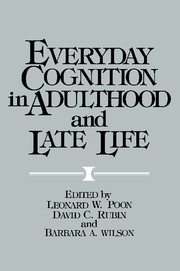Book contents
- Frontmatter
- Contents
- List of contributors
- Preface
- Part I Adult cognitive abilities in the laboratory and in real-life settings: Basic theoretical and methodological issues
- Part IA Systematic approaches to laboratory and real-world research
- Part IB Combining laboratory and real-world research
- Part II Cognition in adulthood and late life: Findings in real-life settings
- Part IIA Everyday cognitive abilities
- Part IIB Concomitant influences
- Part III Cognitive enhancement and aging: Clinical and educational applications
- Part IIIA Issues and perspectives
- Part IIIB Enhancement approaches
- 30 Planning practical memory training for the aged
- 31 Mnemonics as modified for use by the elderly
- Part IIIC Designing programs for cognitive rehabilitation
- Subject index
- Author index
31 - Mnemonics as modified for use by the elderly
Published online by Cambridge University Press: 05 October 2013
- Frontmatter
- Contents
- List of contributors
- Preface
- Part I Adult cognitive abilities in the laboratory and in real-life settings: Basic theoretical and methodological issues
- Part IA Systematic approaches to laboratory and real-world research
- Part IB Combining laboratory and real-world research
- Part II Cognition in adulthood and late life: Findings in real-life settings
- Part IIA Everyday cognitive abilities
- Part IIB Concomitant influences
- Part III Cognitive enhancement and aging: Clinical and educational applications
- Part IIIA Issues and perspectives
- Part IIIB Enhancement approaches
- 30 Planning practical memory training for the aged
- 31 Mnemonics as modified for use by the elderly
- Part IIIC Designing programs for cognitive rehabilitation
- Subject index
- Author index
Summary
In recent years, considerable attention has been paid to pharmacologic treatments for senile dementias (Reisberg, Ferris, & Gershon, 1979). Many researchers have also studied memory complaints as a sign of depression in the elderly and have attempted to differentiate them from dementia (Kahn et al., 1975; Kiloh, 1961; Wells, 1979). Little work, however, has been done toward developing practical strategies to help nondepressed elderly people experiencing age-related cognitive decline.
Researchers have documented that nondepressed elderly people may score in the “normal” range on screening tests for senile dementia, though still experiencing age-related cognitive declines, a phenomenon recently described in a series of meetings of the National Institute of Mental Health (NIMH) as “minimal memory impairment” (MMI) (Annapolis and Key West, November 1985). Craik's classic review of memory and aging (1977) and Poon's extensive recent review (1985) list a wide variety of significant and substantial declines in memory function in old versus young “normals.” Elders who want to continue to work as long as possible may be appropriately concerned if these “normal” losses lead to reduced ability to function professionally or lead to social embarrassment. The purpose of this chapter is to review the cognitive changes that occur with normal aging, critically discuss prior attempts to reduce these losses, present some recent modifications to these attempts, and then finally focus on the limitations of current studies with implications for future research.
- Type
- Chapter
- Information
- Everyday Cognition in Adulthood and Late Life , pp. 598 - 612Publisher: Cambridge University PressPrint publication year: 1989
- 27
- Cited by



